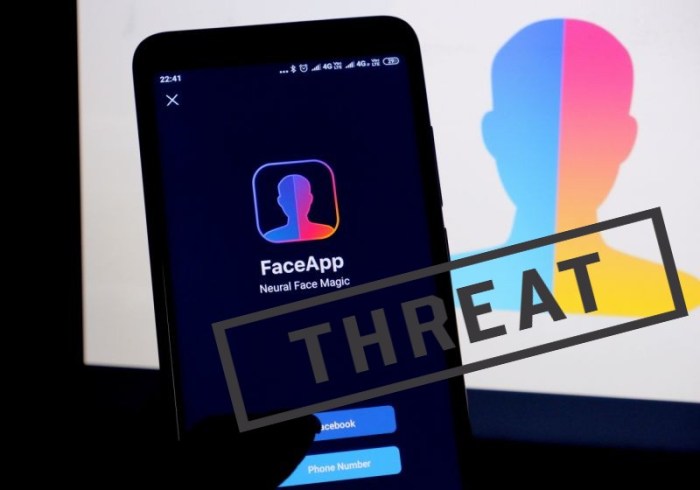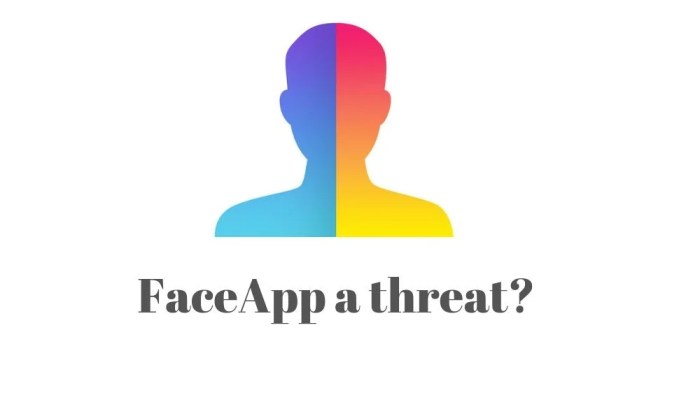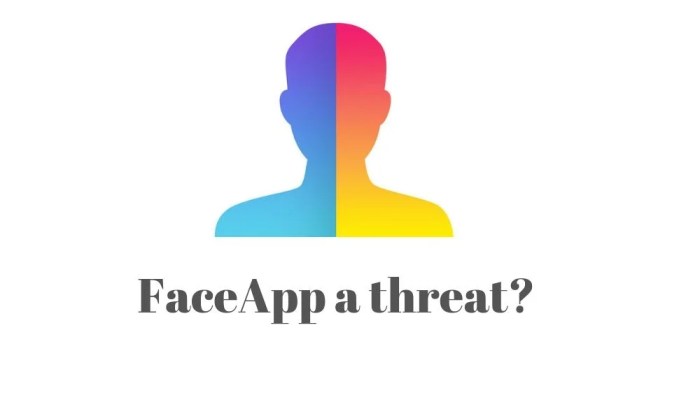Faceapp is the viral app a threat to your online privacy – FaceApp is the viral app, a threat to your online privacy, and this exploration dives deep into the potential risks. From its rapid rise to its data collection practices, we’ll uncover the concerns surrounding this popular photo-editing app. We’ll examine its features, user experience, and the potential implications of its data handling. This investigation also delves into privacy policies, security vulnerabilities, user concerns, and potential alternatives.
Ultimately, understanding these aspects is key to making informed decisions about using FaceApp and similar apps.
FaceApp’s popularity stems from its user-friendly interface and diverse array of features, particularly its ability to manipulate facial appearances. This ease of use, however, may mask potentially problematic data collection practices. We’ll examine the specific data points FaceApp might collect and the methods used to gather that information. This includes looking at user images, location data (if applicable), and preferences.
Introduction to FaceApp
FaceApp is a popular mobile application that allows users to apply various filters and effects to their photos and videos, primarily focusing on facial manipulation. Its widespread appeal stems from the ability to create stylized images, including age progression and regression, and other aesthetic enhancements. The app’s user-friendly interface and diverse range of features have contributed to its popularity, particularly among social media users seeking to experiment with visual transformations.The typical user experience involves selecting a photo, choosing from a menu of filters and effects, and then applying the desired transformation.
Users often share the altered images on social media platforms, leading to the widespread dissemination of the app’s output. This interactive process, coupled with the ease of sharing, fuels the app’s popularity and the engagement within its user community.
Development and Popularity
FaceApp’s development began in 2017, with a gradual increase in popularity over the following years. The app’s success can be attributed to its effective marketing strategies and user-friendly design. The feature of age progression/regression was a key driver in the app’s rapid rise, generating significant viral activity and user engagement on social media platforms.
Key Features
| Feature | Description |
|---|---|
| Age Progression/Regression | Allows users to apply filters that simulate aging or reversing the aging process. |
| Makeup and Beauty Filters | Offers a wide range of filters to enhance facial features with makeup and other aesthetic effects. |
| Hair and Accessory Changes | Enables users to alter their hair color, style, and add accessories to their photos. |
| Other Effects | Includes other effects like different poses, facial expressions, and various artistic filters. |
| Photo and Video Editing | Supports the editing of both photos and videos. |
Data Collection Practices
FaceApp, a popular image manipulation app, has garnered significant attention, not just for its impressive features but also for its data collection practices. Understanding how the app collects and uses user data is crucial for evaluating its potential impact on online privacy. This section delves into the types of data collected, the methods employed, and compares FaceApp’s practices to those of similar apps.The core of FaceApp’s functionality revolves around user-provided images.
This necessitates the collection of extensive data, raising concerns about privacy. A critical analysis of the app’s terms of service and operational mechanisms is necessary to fully grasp the scope of this data collection. User awareness and informed consent are essential elements in navigating the digital landscape.
Types of User Data Collected
FaceApp collects a variety of user data to enable its image manipulation features. This includes, but is not limited to, the images uploaded by users for processing. The app also potentially gathers metadata associated with these images, such as timestamps and file formats. Beyond image data, FaceApp might acquire user preferences related to image filters and adjustments.
This preference data could encompass frequency of use, preferred styles, or specific image effects. In the context of image-based applications, such data collection is not uncommon, but its implications for privacy must be considered.
FaceApp’s recent surge in popularity raises questions about online privacy. Knowing who links to your site is crucial for understanding potential data exposure. For example, if a site linking to mine, who links to my site , is inadvertently sharing user data, it could compromise your personal information. Ultimately, the potential privacy risks of apps like FaceApp remain a concern.
Methods of Data Collection
FaceApp likely utilizes several methods to collect user data. Directly uploading images for processing is a primary method. Additionally, the app may collect data through user interactions within the application, such as selecting filters or adjusting parameters. Further, the app may collect data passively, such as device information or usage patterns. This collection could be through cookies or other tracking technologies.
Comparison of Data Collection Practices
| Feature | FaceApp | Other Similar Apps |
|---|---|---|
| Image Data | Collects images uploaded for processing, including metadata. | Collects images for processing, potentially with metadata. |
| User Preferences | Potentially collects preferences for filters, adjustments, and usage patterns. | Collects preferences for user experience customization. |
| Location Data | Potentially collects location data if linked to a user’s device. | May or may not collect location data depending on the functionality. |
| Other Data | May collect device information, usage patterns, and other application-related data. | Collects device information, application usage patterns, and potentially other user-related data. |
This table highlights a general comparison. Specific data collection practices may vary significantly between apps. The nature and extent of data collection can significantly impact the user’s privacy. Furthermore, the user’s agreement to the terms of service should be carefully considered. A thorough understanding of the terms of service and data privacy policies of the app is crucial for informed decision-making.
Privacy Policies and Terms of Service
FaceApp’s privacy practices, as Artikeld in its terms of service and privacy policy, are crucial for understanding how the app handles user data. These policies dictate the extent to which user information is collected, used, and shared, raising concerns about data security and user control. A careful review of these policies is essential for any user considering the app’s use.
Summary of FaceApp’s Privacy Policy and Terms of Service
FaceApp’s privacy policy and terms of service document the app’s data handling procedures. The policy details how FaceApp collects, uses, and shares user data, including personal information, photos, and videos. The terms of service specify the legal agreement between the user and FaceApp, outlining the user’s responsibilities and the app’s rights regarding the use of its services. Crucially, it clarifies the scope of data collection and use, particularly concerning the processing of user-provided images and data.
Sections Related to Data Usage and Sharing
FaceApp’s policies explicitly address data usage and sharing. Specific sections likely detail the types of data collected (e.g., device information, user-uploaded images, location data if enabled). These sections also specify how the collected data is used for the app’s functionality, such as image processing and providing user-requested services. The policies should clearly Artikel the circumstances under which data might be shared with third-party entities, including the nature of the sharing and the recipients.
It’s vital to identify the legal basis for data processing and potential transfer of user data to other jurisdictions.
While FaceApp’s viral appeal is intriguing, its privacy implications are a concern. Understanding how to identify and reach your ideal customer base is key to success in any business. For example, refining your client targeting with strategies like 7 steps to improve your client targeting can lead to higher conversion rates. Ultimately, staying informed about app data practices is crucial to safeguard your personal information in the digital age.
Comparison to Industry Standards and Competitor Apps
FaceApp’s privacy policies are compared against industry standards and competitor apps. A comprehensive review would assess whether FaceApp’s data handling practices align with recognized best practices, such as data minimization, purpose limitation, and data security standards. Comparisons to other photo editing apps, focusing on similar features and data handling, are essential for context. Such analysis should also highlight any notable differences in data protection and user control between FaceApp and its competitors.
Key Provisions of FaceApp’s Privacy Policy
| Provision | Description |
|---|---|
| Data Collection | Details the types of data collected, such as user-provided images, device information, and potentially location data. This includes how the data is collected and the purpose of the collection. |
| Data Usage | Artikels how collected data is used for the functionality of the app, such as image processing and service delivery. The policy should clearly articulate the limitations of data usage. |
| Data Sharing | Specifies the circumstances under which data might be shared with third-party entities, including the reasons for sharing, the recipients, and any legal bases for the sharing. |
| User Rights | Describes user rights regarding access, rectification, and erasure of personal data, in accordance with applicable data protection regulations. |
| Security Measures | Details the security measures implemented to protect user data from unauthorized access, use, disclosure, alteration, or destruction. |
Security Risks and Vulnerabilities
FaceApp, despite its popularity, raises legitimate concerns about user data security. The app’s reliance on cloud-based processing and its global user base necessitates a critical examination of potential vulnerabilities and how users can protect themselves. While FaceApp’s privacy policy Artikels data handling procedures, understanding the possible risks is crucial for informed decision-making.Understanding the potential security risks is paramount to navigating the digital landscape safely.
This section delves into the vulnerabilities inherent in FaceApp’s architecture, contrasting its security measures with those of other photo-editing apps, and providing actionable steps for users to minimize potential threats.
Potential Security Risks
FaceApp, like many cloud-based applications, relies on servers to process user data and deliver results. This reliance introduces several potential risks. Compromised servers could lead to unauthorized access to user images and personal information. Additionally, if the app’s algorithms or code contain vulnerabilities, malicious actors could exploit them to gain unauthorized access to user data. Insufficient data encryption during transmission and storage further amplifies the risk of data breaches.
Vulnerabilities in FaceApp’s Architecture
Several architectural vulnerabilities are possible in FaceApp’s system. One potential vulnerability lies in the use of third-party libraries or components within the app’s codebase. These libraries, if not rigorously vetted, could contain previously unknown vulnerabilities, potentially exposing user data. Another vulnerability may arise from the app’s reliance on a central server for processing. A single point of failure, such as a server outage or a cyberattack targeting the server, could lead to the loss of user data or functionality.
In addition, insufficient access controls on the server-side could allow unauthorized access to user data.
Comparison with Other Photo Editing Apps
Different photo-editing apps adopt varying security measures. Some prioritize end-to-end encryption, ensuring that only the user and the recipient have access to the data. Others utilize strong encryption methods to secure data in transit and at rest. Comparing FaceApp’s security measures with these more secure practices reveals areas where FaceApp might need to strengthen its approach to data protection.
It’s important to note that the security posture of any app can be affected by the rate of updates and maintenance, and the thoroughness of security audits.
User Mitigation Strategies
Users can take proactive steps to mitigate potential security risks associated with FaceApp. Regularly updating the app to patch known vulnerabilities is crucial. Users should also be cautious about sharing sensitive personal information through the app. Moreover, users should scrutinize FaceApp’s privacy policy to understand how their data is handled. Finally, users should refrain from using the app on unsecured Wi-Fi networks, as this significantly increases the risk of unauthorized access to their data.
User Concerns and Perspectives
FaceApp, despite its viral popularity, has faced significant scrutiny regarding its data collection practices. Users have voiced concerns about the extent of information shared with the app and how this data is handled. Understanding these concerns is crucial for assessing the app’s impact on user privacy and trust. The following sections delve into specific user anxieties and how FaceApp has (or hasn’t) addressed them.
User Concerns Regarding Data Security
User concerns about data security revolve primarily around the potential for misuse of personal information. Users have expressed apprehension about the security of their images and personal data, especially considering the app’s location (Russia). The fear is not unfounded, as geopolitical contexts and varying data protection regulations can influence how companies handle user data.
Examples of User Concerns and Their Resolution (or Lack Thereof)
Numerous user comments on various platforms highlight concerns about data privacy. Some users expressed worry that their facial data might be used for purposes beyond image manipulation. Others raised questions about the extent of data retention and how this data is secured. For example, one common criticism is the lack of transparency regarding the specific algorithms used to process user data.
This lack of transparency fuels uncertainty about how the data is used and potentially shared.
Common User Criticisms
- Lack of Transparency: Users frequently criticized FaceApp for its limited explanations regarding data handling practices. A lack of detailed information regarding data storage, usage, and sharing procedures fostered user apprehension.
- Data Security Concerns: Users voiced concerns about the security of their facial data and the potential for unauthorized access or misuse. These concerns were further amplified by the app’s origin and operational location.
- Limited Control over Data: Users pointed out a perceived lack of control over their data. Users felt they had limited options for managing how their data was used and shared, particularly concerning data deletion or modification.
- Unclear Terms of Service: The complexity and obscurity of FaceApp’s terms of service led to user confusion regarding the implications of using the app. Many users admitted to not fully comprehending the terms before downloading and using the app.
- Lack of Independent Verification: Users often questioned the absence of independent verification or audits regarding the security of FaceApp’s data practices. This lack of external scrutiny raised concerns about the app’s commitment to safeguarding user data.
Alternatives and Comparisons
FaceApp’s popularity, while impressive, raises valid concerns about data privacy. Users should explore alternative apps with robust privacy policies and transparent data handling practices. The following analysis highlights potential alternatives and their differing approaches to data collection.
Potential Alternatives to FaceApp
Several apps offer similar functionalities to FaceApp, but with different privacy profiles. Choosing an alternative requires careful consideration of how personal data is handled. These alternatives often emphasize user control and transparency in their data practices.
Comparison of Data Collection Practices
The table below compares FaceApp with alternative apps, focusing on their data collection policies. Understanding these differences is crucial for making informed decisions about which app to use.
| App | Data Collection Practices | Privacy Features | Security Measures |
|---|---|---|---|
| FaceApp | Collects user photos and potentially other data. Privacy policy is often cited as a concern by users. | Limited user control over data usage and sharing. Transparency is a debated issue. | Security measures are often subject to public scrutiny. |
| PicsArt | Collects user photos and edits. Privacy policy is available, but the scope of data collected remains a concern for some. | Offers various editing tools. User control is a bit more explicit than in FaceApp. | Security measures are generally well-regarded, although specific details are sometimes lacking. |
| Adobe Photoshop Express | Focuses on photo editing. Data collection is largely limited to user account information if one is created. | Provides advanced photo editing tools. User control is emphasized in the context of account management. | Adobe has a strong reputation in security. |
| PhotoDirector | Offers various photo editing features. Focuses on editing and design, with a moderate amount of user data collection. | Transparency regarding data collection is generally considered adequate. | Security is generally well-regarded. |
Privacy Features in Alternatives
Many alternatives to FaceApp prioritize user privacy. Some emphasize the secure storage of user data, limit data sharing with third parties, and provide users with granular control over their data. Transparency in data handling practices is a key aspect that differentiates the better options. For instance, Adobe Photoshop Express prioritizes user data security within its account management systems.
Other apps like PicsArt offer a degree of control over the types of data they collect.
Security Considerations in Alternatives
Security is paramount when choosing any photo-editing app. Alternatives to FaceApp should have robust security measures in place to protect user data from unauthorized access. The use of end-to-end encryption is an important consideration, as is the implementation of secure data storage practices.
Potential Impacts on Users

FaceApp’s data collection practices, while offering a seemingly harmless photo editing service, carry potential consequences for users. Understanding these implications is crucial for informed decision-making regarding the use of such apps. The potential for misuse of personal data, coupled with a lack of transparency, can erode user trust and damage the app’s reputation.The consequences of these data practices extend beyond individual user profiles.
The potential for misuse of collected data, coupled with a lack of transparency and clear security measures, can create a cascade of negative impacts, including financial loss, reputational damage, and even legal ramifications.
Consequences of Data Practices
Data breaches and privacy violations can have profound effects on users. Personal information, including photos, facial recognition data, and potentially sensitive data, can be exposed to malicious actors. This exposure can lead to identity theft, harassment, and even financial exploitation. Users may experience emotional distress and anxiety as a result of their personal data being compromised. Moreover, the lack of clear and transparent data handling practices can further damage user trust.
FaceApp, the viral app, raises valid privacy concerns. While it’s fun to play with, it’s worth considering how AI is increasingly used in applications like image manipulation. This also touches on the larger implications of AI’s impact on search, as explored in this insightful piece on how AI will impact search. Ultimately, the more AI-powered tools we use, the more critical it becomes to understand the potential data collection involved.
So, even a seemingly harmless app like FaceApp can potentially lead to broader privacy issues.
Impact on User Trust and Reputation
The app’s reputation is directly linked to user trust. When users perceive a lack of security or transparency in data handling practices, trust diminishes. This decline in trust can lead to a decrease in user engagement and adoption. Negative publicity surrounding data breaches and privacy concerns can significantly harm an app’s reputation, impacting future development and market share.
Such issues can drive users away to alternative applications with better perceived security and privacy practices.
Potential for Misuse of User Data
Collected user data can be misused in various ways, impacting both individual users and the wider community. This includes the potential for unauthorized access and sharing of personal data, leading to identity theft, financial fraud, and targeted harassment. In some cases, data may be used to manipulate or influence user behavior, potentially leading to social engineering attacks. This misuse can have serious consequences for users’ well-being and financial stability.
Facial recognition data, for example, could be misused to track individuals or compromise their privacy in unforeseen ways.
Examples of Similar Privacy Breaches
Numerous cases illustrate the potential consequences of privacy violations. The Cambridge Analytica scandal, for instance, highlighted the risks of data collection and its misuse in political campaigns. The scandal revealed how personal data was harvested without users’ knowledge or consent and exploited for political purposes. Similarly, various data breaches involving other social media platforms and online services have demonstrated the significant potential for harm when personal data is compromised.
These past examples underscore the importance of robust security measures and transparent data practices to prevent similar occurrences. These incidents, though varied in scope, demonstrate a common theme: the vulnerability of user data and the importance of strong privacy protections.
Industry Best Practices and Regulations

FaceApp’s data handling practices are scrutinized against a backdrop of evolving industry standards and regulations. Understanding these benchmarks is crucial for assessing the app’s potential impact on user privacy. This section delves into key data privacy principles, relevant regulations, and how FaceApp measures up.
Industry Best Practices for Data Privacy
Data privacy best practices emphasize transparency, user control, and security. Organizations are expected to clearly communicate data collection practices, provide users with choices regarding their data, and implement robust security measures to safeguard sensitive information. These principles aim to build trust and empower users in managing their digital footprint.
- Transparency and Notice: Clear communication about data collection practices, usage, and sharing is paramount. Users should be informed of what data is collected, why it’s collected, and how it will be used. This includes explicit consent mechanisms where necessary.
- Data Minimization: Collecting only the data necessary for the stated purpose is a key best practice. Excessive or irrelevant data collection should be avoided.
- Security and Protection: Implementing robust security measures to protect user data from unauthorized access, use, disclosure, alteration, or destruction is critical. This includes encryption, access controls, and regular security audits.
- User Control and Choice: Users should have control over their data, including the ability to access, modify, delete, or opt out of data collection and use.
Relevant Data Privacy Regulations
Several data privacy regulations worldwide influence how companies like FaceApp handle user data. These regulations impose specific obligations regarding data collection, processing, and security.
- General Data Protection Regulation (GDPR): The GDPR, applicable in the European Union, sets stringent standards for data protection, requiring organizations to obtain explicit consent for data processing and providing users with significant rights regarding their data. This regulation emphasizes user control and transparency.
- California Consumer Privacy Act (CCPA): The CCPA, enacted in California, grants consumers significant rights related to their personal information, including the right to know what personal information is collected, the right to delete it, and the right to opt out of the sale of their personal information.
- Other Regulations: Numerous other regional and national regulations, such as the Brazilian General Data Protection Law (LGPD) and similar laws in other jurisdictions, establish similar principles for data protection.
FaceApp’s Compliance with Standards and Regulations
Assessing FaceApp’s compliance with these standards and regulations requires detailed examination of their data collection practices, privacy policy, and security measures. Publicly available information, such as the app’s privacy policy, needs to be evaluated to determine if FaceApp meets the Artikeld standards. FaceApp’s compliance or lack thereof directly impacts the trust users place in the app.
“The GDPR requires controllers to provide individuals with specific information about how their personal data is processed, including the purposes of the processing, the categories of personal data concerned, and the recipients of the data.”
Illustrative Scenarios and Examples: Faceapp Is The Viral App A Threat To Your Online Privacy
FaceApp’s popularity raises legitimate concerns about user data privacy. While the app offers appealing features, the potential for misuse of collected information is a crucial aspect to consider. Understanding how this data could be negatively impacted requires exploring potential scenarios and examples of how it might be used or misused. This section will illustrate the risks associated with data practices like those employed by FaceApp, drawing parallels with real-world privacy breaches in similar contexts.
Potential Negative Impacts on User Data
User data, including personal images and potentially sensitive information, can be vulnerable to misuse. FaceApp’s data collection practices, while not explicitly malicious, could be exploited in unforeseen ways. The company’s terms of service and privacy policy should be thoroughly reviewed to understand the extent of data collection and potential use cases.
- Data breaches and unauthorized access: A potential scenario involves a security breach compromising the FaceApp database. This could expose user data to malicious actors, leading to identity theft, financial fraud, or harassment. Past incidents, such as the Cambridge Analytica scandal, highlight the severity of such breaches and their potential consequences.
- Data misuse for targeted advertising: FaceApp could potentially use user data to create detailed profiles and tailor advertisements to individual preferences. This could lead to unwanted or intrusive marketing campaigns, and potentially contribute to the spread of misinformation and biased content. Examples of targeted advertising in other sectors illustrate the potential for manipulation.
- Data sharing with third parties: Without clear and transparent agreements, FaceApp might share user data with third-party companies for various purposes, including marketing or research. This could expose users to risks associated with data sharing and potential violations of privacy. Companies engaging in data sharing with unknown or untrusted parties present an inherent risk to user privacy.
Examples of Data Misuse
Misuse of user data is not confined to hypothetical scenarios. Real-world instances of privacy breaches highlight the risks associated with inadequate data protection.
- Targeted advertising campaigns: Companies have been criticized for using user data to create highly personalized advertising campaigns, potentially influencing political outcomes or promoting misleading information. These campaigns are a real-world example of how user data can be misused for persuasive and potentially harmful purposes.
- Data breaches in social media: Several social media platforms have experienced data breaches, exposing user information to unauthorized access. These breaches highlight the vulnerabilities inherent in large-scale data storage and the importance of robust security measures.
Hypothetical Scenario: Data Misuse and Consequences, Faceapp is the viral app a threat to your online privacy
Imagine a user, Sarah, using FaceApp to apply a facial filter. Unbeknownst to Sarah, FaceApp’s data security protocols are weak. A hacker gains access to Sarah’s profile data, including her personal images and potentially her location data. The hacker uses this information to impersonate Sarah, sending fraudulent messages and making false claims. Sarah suffers reputational damage and financial loss.
This scenario demonstrates the potential for serious consequences when user data is not protected adequately.
Closing Notes
In conclusion, FaceApp’s viral status and attractive features mask potential risks to user privacy. The app’s data collection practices raise concerns, and users should be aware of the potential implications. While the app offers a convenient service, it’s crucial to weigh the advantages against the privacy risks involved. Alternatives with stronger privacy safeguards may be worth considering.
By understanding the potential consequences and the best practices in the industry, users can make informed decisions to protect their personal data.






